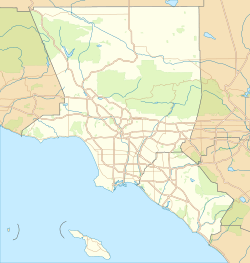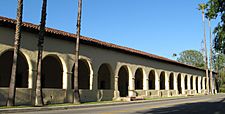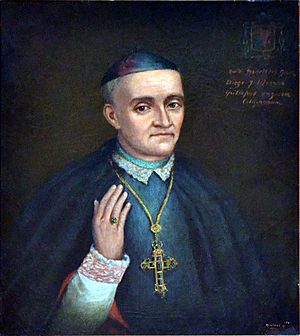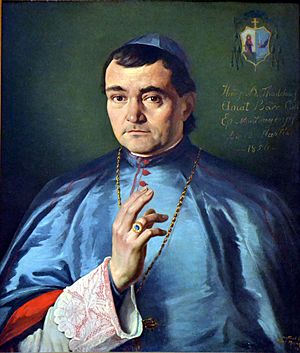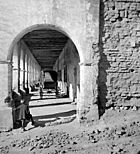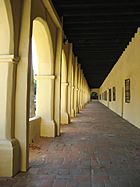Convento Building (Mission San Fernando) facts for kids
Quick facts for kids |
|
|
Mission San Fernando Rey de Convento Building
|
|
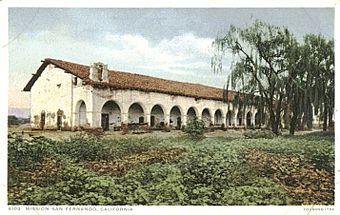
A postcard showing the Convento Building around the year 1900.
|
|
| Location | 15151 San Fernando Mission Blvd., Mission Hills, Los Angeles, California |
|---|---|
| Built | 1808–1822 |
| Architectural style | Colonial |
| NRHP reference No. | 88002147 |
| Added to NRHP | October 27, 1988 |
The Convento Building is a famous historic building in California, known for its long, beautiful walkway with many arches. This covered walkway is called a portico or colonnade. Built between 1808 and 1822, the Convento is the only original building left from the historic Mission San Fernando Rey de España.
Located in the Mission Hills area of the San Fernando Valley, this building is special for a few reasons. It was the largest building in California made from adobe (sun-dried mud bricks) and the biggest original building at any of the California missions.
Contents
A Closer Look at the Convento
The Convento is a very large, two-story building. It is about 243 feet (74 m) long and 50 feet (15 m) wide, with thick adobe walls that are four feet thick! It was built in several stages over many years.
The most famous part of the Convento is its long portico with 20 arches. This is the image most people think of when they picture the Mission San Fernando. Inside, the Convento also has a library filled with 1,760 books, some of which are very old, dating from the 1500s to the 1800s.
From Mission Home to Historic Landmark
The Convento has had a long and interesting history, serving many different purposes over the years.
A Home for Missionaries
When the Mission was active, the Convento was the living quarters for the missionaries. It also provided a place to stay for priests traveling along the El Camino Real, the historic road connecting the California missions. California's first bishop, Francisco García Diego y Moreno, lived in the Convento for 15 years, from 1820 to 1835.
Changing Times
In 1846, the Mexican government took control of the missions. The governor, Pio Pico, sold the Mission San Fernando to a man named Elogio de Chelis.
A year later, in 1847, an American military leader named John C. Fremont came to California. He used the Convento as his headquarters. From 1857 to 1861, the building even served as a station for the Butterfield Stage Line, a famous stagecoach route.
By the late 1800s, the building was in bad shape. An 1883 article in the Los Angeles Times said the mission was "rapidly going to decay." However, it noted that the Convento was the one building in fair condition because it was so large and well-built.
Saving a Landmark
Thankfully, people began to work to save the historic building. In 1896, a group called the Landmarks Club, led by Charles Fletcher Lummis, leased the mission for ten years to restore it. They held a large celebration for the mission's 100th anniversary in 1897.
A newspaper report from that time said the Convento had "withstood more successfully the ravages of time" because it was "strongly built." The report described its tile roof as mostly intact and its heavy doors and window grates as still strong.
Surviving an Earthquake
More restoration work happened over the years. In 1963, workers repaired the roof and strengthened the building. They discovered that the original beams were tied together with strong rawhide strips, showing the skilled work of the Shoshone people who first built it.
In February 1971, a major earthquake hit the area. The mission's main church was destroyed, and the Convento was damaged. While the church had to be rebuilt, the Convento was strong enough to be repaired. It was restored in 1973.
Today, the Convento is the only original building left from the Mission San Fernando. Because of its unique history and importance, it was added to the National Register of Historic Places in 1988.
See also
 | Chris Smalls |
 | Fred Hampton |
 | Ralph Abernathy |


